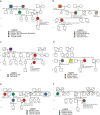Germline mutations of breast cancer susceptibility genes through expanded genetic analysis in unselected Colombian patients
- PMID: 38890714
- PMCID: PMC11184794
- DOI: 10.1186/s40246-024-00623-7
Germline mutations of breast cancer susceptibility genes through expanded genetic analysis in unselected Colombian patients
Abstract
Background: In Colombia and worldwide, breast cancer (BC) is the most frequently diagnosed neoplasia and the leading cause of death from cancer among women. Studies predominantly involve hereditary and familial cases, demonstrating a gap in the literature regarding the identification of germline mutations in unselected patients from Latin-America. Identification of pathogenic/likely pathogenic (P/LP) variants is important for shaping national genetic analysis policies, genetic counseling, and early detection strategies. The present study included 400 women with unselected breast cancer (BC), in whom we analyzed ten genes, using Whole Exome Sequencing (WES), know to confer risk for BC, with the aim of determining the genomic profile of previously unreported P/LP variants in the affected population. Additionally, Multiplex Ligation-dependent Probe Amplification (MLPA) was performed to identify Large Genomic Rearrangements (LGRs) in the BRCA1/2 genes. To ascertain the functional impact of a recurrent intronic variant (ATM c.5496 + 2_5496 + 5delTAAG), a minigene assay was conducted.
Results: We ascertained the frequency of P/LP germline variants in BRCA2 (2.5%), ATM (1.25%), BRCA1 (0.75%), PALB2 (0.50%), CHEK2 (0.50%), BARD1 (0.25%), and RAD51D (0.25%) genes in the population of study. P/LP variants account for 6% of the total population analyzed. No LGRs were detected in our study. We identified 1.75% of recurrent variants in BRCA2 and ATM genes. One of them corresponds to the ATM c.5496 + 2_5496 + 5delTAAG. Functional validation of this variant demonstrated a splicing alteration probably modifying the Pincer domain and subsequent protein structure.
Conclusion: This study described for the first time the genomic profile of ten risk genes in Colombian women with unselected BC. Our findings underscore the significance of population-based research, advocating the consideration of molecular testing in all women with cancer.
Keywords: Minigene assay; Pathogenic germline variants; Unselected breast cancer; Whole exome sequencing.
© 2024. The Author(s).
Conflict of interest statement
The authors declare that they have no conflicts of interest.
Figures


References
-
- Allemani C, Matsuda T, Di Carlo V, Harewood R, Matz M, Nikšić M, et al. Global surveillance of trends in cancer survival 2000–14 (CONCORD-3): analysis of individual records for 37 513 025 patients diagnosed with one of 18 cancers from 322 population-based registries in 71 countries. The Lancet marzo de. 2018;391(10125):1023–1075. doi: 10.1016/S0140-6736(17)33326-3. - DOI - PMC - PubMed
Publication types
MeSH terms
Substances
LinkOut - more resources
Full Text Sources
Medical
Research Materials
Miscellaneous

